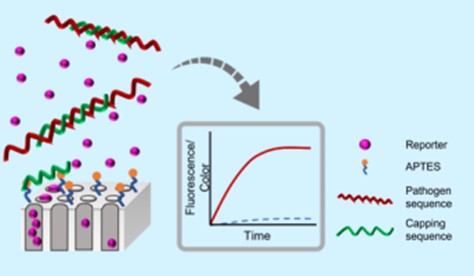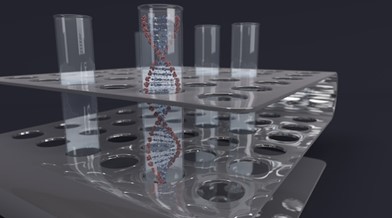Currently there is a general need for detection systems that provide faster, more complete, and more specific information, especially in the health and biomedicine sectors. Furthermore, there is an increasing demand in these areas for systems that allow both rapid and sensitive recognition of, for example, disease-causing pathogens such as bacteria and viruses. However, the detection systems developed until now generally require complex instrumentation and qualified professionals to obtain highly sensitive results.
Researchers from Interuniversity Research Institute for Molecular Recognition and Technology Development (IDM) have developed a detection platform based on the use of molecular gates for the recognition of specific molecules, biomolecules and microorganisms such as pathogens.
The researchers have developed a platform based on nanomaterials equipped with molecular gates. In these systems, the external surface of a porous material is loaded with a molecule that acts as a reporter. The pores’ outlets are blocked with specific functional (bio)molecules that act as molecular gates.
When the analyte of interest is present in a sample, these molecular gates are opened and the reporter is released, triggering a change that can be easily detected. In the technology developed by the researchers, the porous matrix used is nanoporous anodic alumina, while rhodamine B acts as the reporter that allows the detectable change. The gating mechanism is variable and can be adapted depending on the target analyte.

The researchers have already validated the technology for the detection of several common human pathogens.
Benefits:
- Versatile technology that can be used for the detection of several microorganisms, molecules and biomolecules allowing its application in relevant industries such as health, food, security or environmental.
- Adaptable and multiplexed system, thanks to the possibility of choosing a suitable molecular gate depending on the selected analytes.
- The system allows the rapid detection of the target analyte, being able to provide sensitive results in less than an hour.
- Cost-effective technology, given the fact that it bypasses the need for additional instrumentation and professionals.
The represented institution is looking for a collaboration that leads to commercial exploitation of the presented invention.
Institution: Instituto Interuniversitario de Investigación de Reconocimiento Molecular y Desarrollo Tecnológico (IDM).
TRL: 3-4
Protection status: Several patents have been granted in
favor of the researchers for the use of this technology in the specific
detection of different pathogens.
Financed: UCIE IDM 2021 – 2023
Contact: Noelia Mas / noelia@viromii.com

